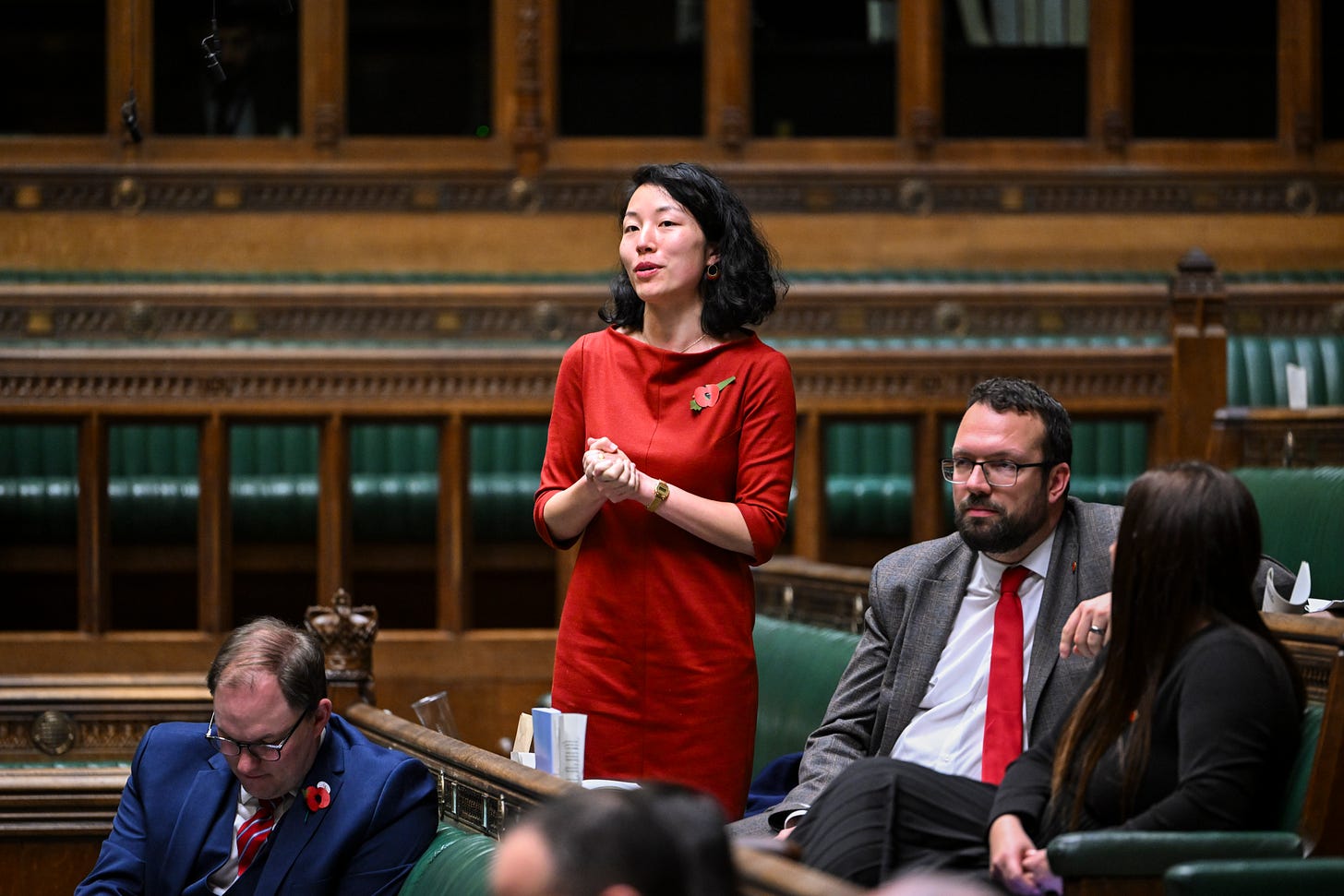MP Yuan Yang fights to shield clubs Like Reading: 'We can't let this happen to more clubs'
Exclusive: With Reading FC in financial peril, Labour MP Yuan Yang tells The Asterisk why football governance reform is urgent.
An absent owner, financial issues, and a Reading squad with only five senior players under permanent contract have stripped The Royals of some of its glamour.
The Berkshire-based club is one of many English outfits embroiled in financial problems. In the fight for Reading’s survival, a new face has been pushing for legislation introduced by the previous government in 2024, which is now being downplayed by some in the Conservative ranks.
Yuan Yang, the UK’s first Chinese-born Member of Parliament, has been deeply involved in securing the future of such clubs.
In the 2024 general election, the Labour candidate won in the newly created Earley and Woodley constituency in Berkshire, defeating the Tories' Pauline Jorgensen.
Last week, Yang spoke in Parliament about the need for a football regulator to pass "the Reading test," ensuring that fans across the country do not have to experience similar misfortunes.
Ownership woes hit Reading hard
Yang, whose constituency includes Reading’s Madejski Stadium, took an interest in the club’s issues long before she ran for office.
“A few years ago, when I was at a fair in Woodley, I was at the Labour Party stall, and a few members of the Sell Before We Dai fan group approached me and asked for support in that campaign,” Yang recalls.
“I wasn't an elected representative then, I wasn't even standing for election back then. But through talking to them, I started to understand how much of a deep impact the ownership problems of Reading have had not just on the club but the wider community,” she tells The Asterisk.
Journalism sharpens Yang’s club insight
Even though external factors have significantly influenced Reading’s current predicament, Yang understands that a club’s affairs off the pitch do not normally draw fans to games.
“Most fans will join a fanbase or go to games not because they're interested in the underlying business of the club, and indeed, most people who watch sports probably don't spend a lot of time worrying about what's keeping the sport alive,” says Yang, who once reported on business.
Before becoming an MP, Yang was a Europe-China correspondent for The Financial Times, where she contributed in-depth stories on the tech industry and the economy.
“Coming to Reading from the perspective of somebody who has seen businesses do all sorts of unusual and sometimes quite unreasonable things that don't benefit the people those businesses are meant to be serving, that is, I think, the financial economics background,” Yang explains, reflecting on how the craft revealed to her the dark underbelly of businesses.
“It’s normal in some sectors to see ownership structures that are there to obfuscate and make scrutiny more difficult when an owner wants to hide something or has a plan in their mind that they’re not going to share with the beneficiaries of that company.
“In sports, that shouldn't be the case in general because of the public-interest nature of football and the way football has such an impact on the community around the club.”
“My journalism background gave me a more cynical view of the way company owners can operate, not in the public interest, and unfortunately, that was really relevant in this case when digging into what was going on at Reading.”
EFL’s cost crisis hits home
From analysing annual reports and accounts of companies during her stint at The Financial Times, it would be natural for the economic expert to wander into the weeds of her home team’s finances.
“The fact that they haven't been filed for a number of years,” Yang begins, reflecting on what surprised her the most when she attempted to look into the club’s accounts.
Reading was the only club in England not to publish its accounts within the stipulated time, leaving many fans in the dark about the extent of the possible financial crisis their team could be facing.
The English Football League (EFL) handed the club a transfer embargo due to the late filing in October last year.
The Royals' wage-to-turnover ratio was also a concerning factor for the Labour MP.
“For this club, as with many actually, it’s the multiples of wages compared to their revenues and the high costs,” she continues. “Which means it can only really operate if it has constant subsidy from its owners, essentially, or from other donors,” she explains, adding that the club has not found itself in a unique situation across the English football pyramid.
“We know that about 58% of clubs are insolvent in the top 92 clubs,” she highlights, referencing a striking finding from the NGO Fair Game’s research. “Meaning they have more liabilities than assets.”
“I think that's also the result of a vicious cycle.”
From poet to protector: Yang’s Journey
Growing up, Yang wanted to become a poet and got into journalism through ‘a series of accidents.’ She is now using her political platform and the expertise built over years to fight for Reading’s survival. Surely, this does not feel like an accident. She was meant to be here.
Yang feels that the owners of many clubs in the lower divisions are pursuing dreams with a high-risk, high-reward strategy.
“Many owners of EFL clubs are chasing a dream to get promotion, into the next league up, or even into the Premier League,” she explains. “And that means they are sometimes pursuing a very short-term strategy of spending huge amounts on wages, competing with, let’s say, relegated Premier League clubs.”
“Unfortunately, if that dream evaporates, the owners can also become really disinterested in the club,” Yang points out. “You've seen that play out, not just specifically in Reading, but in many other clubs across the country.”
Blending bread, roses, and football
Yang has been a prominent figure, often seen on the frontlines of this crucial movement. The average voter might expect her to be focused on ordinary issues, so how does the MP for Earley and Woodley juggle multiple concerns?
“I campaigned on a number of local issues, and Reading is one of them,” she says. “We're also working on things like property management fees for those living in new-build estates, and local NHS access, waiting lists, and GP surgeries. So they're all quite different issues.”
“Some people might say, well, you know, the NHS… housing… they're bread-and-butter issues, what does football matter in this? But in fact, I think football has been one of the issues that residents have really connected with on quite a deep level.”
“And there are many generations of fans who've lived in Reading and followed the club for a very, very long time. I think it's part of the bread and roses of life, you need both. You need the culture, you need the community spirit, you need what brings people together, and Reading Football Club is really a big part of that.”
Her dedication is unquestionable.
Yang's efforts in amplifying Reading's crisis praised
Sarah Turner, the chair of Supporters’ Trust At Reading (STAR), expressed her gratitude for Yang’s passionate support.
“STAR are very grateful for the support that we have received from across the political spectrum throughout the existential crisis at Reading FC,” Turner tells The Asterisk.
“We appreciate Yuan's strong personal advocacy in representing this important community issue in Parliament, with key football stakeholders and raising further awareness of our situation. She has been able to raise issues to a wider audience and highlight our plight.”
The not-for-profit organisation has played an instrumental role in fighting for Reading.
“We are united in advocating for a change of ownership at Reading FC and promoting stronger football governance to support ourselves, other crisis clubs such as Morecambe and our rivals at Swindon as well as other clubs who are at risk of being affected in the future,” Turner added.
Owners silence and approaching Chinese embassy
Silence from Reading owners Dai Yongge and Dai Xiu Li has left fans frustrated. Yang approached the Chinese embassy in an attempt to help contact the owners.
“They (embassy) essentially said this is a private businessman and not something for us to intervene in,” Yang explains.
“In many ways, my approach to this campaign has been just trying to knock on every single door that’s possible. I'm glad that I brought up that issue and addressed it to the embassy, and I understand their response.”
Reading entered a period of exclusivity with a potential buyer in February, reportedly American businessman Robert Platek.
Whoever takes the reins, Yang outlines, the ideal owner would have to be someone who can commit to the club in the long term.
“I think what's important is that it's not just about money and somebody who has money to put into the club,” she says. “Ideally, I'd like to see an owner who has an interest in the sustainable future of the club, who's not just going to chase short-term gains and then abandon the club or sell it in a few years' time.”
“What's most important to me is to see an owner who's invested in Reading's future, whether that's because of their interest in the history, the football, the locality, or whatever it may be. I think those would be really attractive features of a new owner.”
Accelerating the movement
From knocking on every door to pursuing every possible avenue, Yang’s involvement has added a lot of steam to the movement.
Last month, launched a petition, alongside Sell Before We Dai and Supporters’ Trust At Reading, calling for a parliamentary inquiry into the club’s absent owner. The petition has garnered nearly 10,500 signatures online.
The Labour MP presented the petition to Parliament this week, urging the Culture, Media and Sport (CMS) Select Committee and the Business and Trade Select Committee to launch an inquiry.
The Asterisk has reached out to both committees for comment.
“The CMS committee is yet to consider the petition,” a spokesperson tells The Asterisk.
Until then, fans will have to hold on to the Chinese owners for a little longer. The club has indicated that the “structure of the deal should allow for a quick completion” in swapping ownership.
Multiple takeover attempts have fallen through in the past; however, Yang remains optimistic about the latest development.
“I have a lot of faith in the process that's going on right now, so I'm just looking forward to seeing the outcome.”
Football Governance Bill: Yang’s hope for reform
The Football Governance Bill, which once had bipartisan support, has been criticised by Tory leader Kemi Badenoch as a “waste of money,” with Reform UK’s Rupert Lowe calling for it to be “scrapped.”
The bill, supported by 8 in 10 football fans and backed by most MPs, could play a crucial role in how clubs operate in the future.
“I think it is really important,” underscores Yang on its significance for the existence of clubs like Reading. “Just to give a bit of history, there was a fan-led review of football a few years ago, and that then led to the previous government's drafting of the initial football governance bill.”
“This government has taken that and added some improvements. It is now coming through Parliament to the House of Commons, hopefully in the next few months.”
The bill reached its report stage on Tuesday, and a third reading is expected to take place by the end of March.
The bill could become law by the summer, according to EFL Chairman Rick Parry.
The legislation, which promotes a fairer revenue distribution, sustainability, and the prevention of financial mismanagement, will ‘protect clubs and support fans,’ according to Kevin Miles, Chief Executive of the Football Supporters’ Association.
“The main difference it would have made for a club like Reading is that the bill will set up an independent football regulator, which will have the ability to implement an ownership test on existing and prospective owners, and to do that periodically,” highlights Yang.
“Right now, we know that the ability of the EFL to scrutinise owners is much less than it should be.”
Yang's optimism for Reading's future amid challenges
Opposition to the bill and previous failures in takeover attempts have not deterred the young MP from being optimistic about Reading's future prospects.
“I've spoken to such a really engaged group of fans, and there are a lot of people with a lot of dedication who are willing to put a lot of effort into securing a future for the club,” Yang reveals, on what’s giving her hope despite the challenges it’s facing right now.
“A few months ago, I put a call out in the local paper, the Reading Chronicle, asking for pro-bono legal advice. We're now working with a corporate lawyer who's volunteering his time for us, which is amazing,” she recalls. “It's that kind of spirit of volunteering and dedication that gives me a lot of hope.”
“Secondly, the fact that we’re already in exclusive talks for a buyout, and obviously I can't say very much about those talks or the deal.
“I know that we've been here before, and the club has been through previous talks that haven't resulted in the sale.
“I really do have hope that this can succeed.”
But what does success look like for Yang in her efforts to help the club, apart from having an owner that’s invested in the club in the long term?
“It's raising the issue of football governance on the national level and making sure that the new regulator, the government, and other clubs learn from what's happened not just at Reading, but many other clubs in the last few years, so that we don't come here again and no future club has to be in this position again.”








